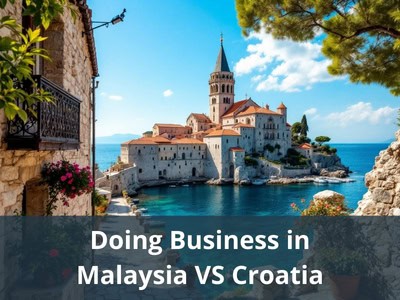Doing Business in Malaysia VS Croatia – A Comparison
 Entrepreneurs considering market expansion in Asia or Europe often compare Malaysia and Croatia. Both countries offer attractive business advantages depending on your goals. Malaysia is praised for its affordable setup costs, digital incorporation, and regional market access. Croatia, an EU member, offers easy entry into the European market and incentives for foreign investors. This comparison highlights the key factors to help you choose the most suitable destination for your business.
Entrepreneurs considering market expansion in Asia or Europe often compare Malaysia and Croatia. Both countries offer attractive business advantages depending on your goals. Malaysia is praised for its affordable setup costs, digital incorporation, and regional market access. Croatia, an EU member, offers easy entry into the European market and incentives for foreign investors. This comparison highlights the key factors to help you choose the most suitable destination for your business.
Key Comparison Points
Business Environment
- Malaysia: Malaysia provides a pro-business environment supported by digital infrastructure, government grants, and efficient regulation via the Companies Commission of Malaysia (SSM).
- Croatia: Croatia offers a stable EU-based economy with access to European markets. However, foreign investors may face complex bureaucracy and slower business processes.
Taxation
- Malaysia: Malaysia has a flat corporate tax rate of 24% and does not tax most capital gains. Learn more in this Malaysia company registration guide.
- Croatia: Croatia applies a corporate tax rate of 10% or 18%, depending on revenue, and imposes capital gains tax at 10% after a two-year holding period.
Ease of Company Incorporation
- Malaysia: Incorporation is fast and digital via MyCoID. Most sectors allow 100% foreign ownership. You can explore company incorporation in Malaysia or engage company incorporation services for support.
- Croatia: Company formation requires notary services, translation of documents, and a longer setup timeline. Some business types require physical presence.
Cost of Living and Business Operations
- Malaysia: Office rental, labor, and utilities are affordable. That makes setting up businesses in Malaysia a low-risk option for startups and SMEs.
- Croatia: Operating costs in Croatia are lower than in Western Europe, but higher than in Southeast Asia. Coastal cities tend to be more expensive for rent and services.
Access to Markets
- Malaysia: Malaysia provides trade access through ASEAN, RCEP, and CPTPP. You can connect with 3E Accounting or browse our services to get started.
- Croatia: Croatia offers access to EU member states and benefits from EU structural funds. It is a good base for companies targeting European markets.
Quick Comparison Overview
Here’s a quick overview of the key differences for easy reference.
| Factor |
Malaysia |
Croatia |
| Business Environment |
Stable, digital-first, SME-friendly |
Stable, EU-based, more paperwork |
| Corporate Tax Rate |
24% |
10% or 18% based on revenue |
| Capital Gains Tax |
Not applicable (in most cases) |
10% (after two years) |
| Ease of Incorporation |
Fast, online, 100% foreign-owned allowed |
Manual, requires local notary and documents |
| Business Costs |
Low operational and living costs |
Moderate, higher in coastal areas |
| Market Access |
ASEAN, CPTPP, RCEP |
EU member access |

Benefits of Choosing 3E Accounting
Selecting the right partner is crucial when it comes to starting a business in Malaysia. At 3E Accounting, we offer a comprehensive range of solutions designed to simplify the entire process of company incorporation in Malaysia. From ensuring compliance with local regulations to providing expert guidance tailored to your specific needs, we make the journey seamless.
For entrepreneurs looking to navigate Malaysia company registration or explore company setup in Malaysia, our team provides unmatched expertise and support. Additionally, our company incorporation services are tailored to help you succeed in the competitive business environment.
With a deep understanding of the region’s business landscape, we also provide resources for setting up businesses in Malaysia, ensuring that every step is clear and efficient. Whether you need assistance with corporate secretarial or company secretary services, we are here to help.
To explore our services or discuss your business needs, contact 3E Accounting. With our strong presence in Malaysia and a proven track record, we are your trusted partner for success in Asia.
Ready to Expand into Malaysia? Choose 3E Accounting Today!
Stay Secure, Stay Successful With 3E Accounting Services
Contact Us Now
Frequently Asked Questions
Malaysia supports fully digital incorporation via MyCoID. In contrast, Croatia requires notary services and translated documents. Read this Malaysia company registration guide for step-by-step info.
Malaysia has a flat 24% corporate tax and no capital gains tax for most cases. Croatia uses a 10% or 18% tax rate based on revenue, and capital gains are taxed at 10% after two years.
Abigail Yu oversees executive leadership at 3E Accounting Group, leading operations, IT solutions, public relations, and digital marketing to drive business success. She holds an honors degree in Communication and New Media from the National University of Singapore and is highly skilled in crisis management, financial communication, and corporate communications.



